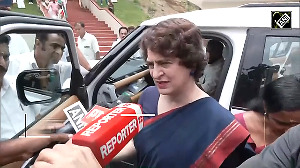European investigators have uncovered evidence that hundreds of football matches at club and national level were fixed around the globe in a scam run from Singapore, police said on Monday.
A joint inquiry by Europol, the European anti-crime agency, and national prosecutors has identified about 680 suspicious matches including qualifying games for the World Cup and European Championships, and for the Champions League for European club sides, Europol head Rob Wainwright said.
The matches, some of which have already been subject to successful criminal prosecutions, were played between 2008 and 2011. About 380 of the suspicious matches were played in Europe, and a further 300 were identified in Africa, Asia, and south and central America.
Football is the world's most popular sport, watched by billions live and on television around the globe and making huge profits for some clubs and broadcasters.
Last year the head of an anti-corruption watchdog estimated that $1 trillion was gambled on sport each year - or $3 billion a day - with most coming from Asia and put on football matches.
A German investigator described a network involving couriers ferrying bribes around the world, paying off players and referees in the fixing which involved about 425 corrupt officials, players and serious criminals in 15 countries.
"We have evidence for 150 of these cases, and the operations were run out of Singapore with bribes of up to 100,000 euros paid per match," said Friedhelm Althans, chief investigator for police in the German city of Bochum, told a news conference.
Investigators said no names of players or clubs would be released while the investigation proceeded. However, the fixing also included top flight national league matches in several European countries, as well as two Champions League matches, including one played in Britain.
Singapore police said last month that they were helping Italian authorities to investigate alleged match fixing involving a Singaporean, but said he had not been arrested or charged with any offence there.
Althans said that, though German police had concrete proof of 8 million euros ($11 million) in gambling profits from the match fixing, this was probably the tip of the iceberg.
Investigators described how gang members immediately subordinate to the Singapore-based leader of a worldwide network were each tasked with maintaining contacts with corrupt players and officials in their parts of the world.
Laszlo Angeli, a Hungarian prosecutor, gave an example of how the scam worked. "The Hungarian member, who was immediately below the Singapore head, was in touch with Hungarian referees who could then attempt to swing matches at which they officiated around the world," he said.
Accomplices would then place bets on the internet or by phone with bookmakers in Asia, where bets that would be illegal in Europe were accepted. "One fixed match might involve up to 50 suspects in 10 countries on separate continents," said Althans.
"Even two World Cup qualification matches in Africa, and one in Central America, are under suspicion," Althans added.
TOUGH TO FIX
World soccer's governing body FIFA issued a statement pointing to quotes from its Director of Security, Ralf Mutschke, before a match-fixing conference in Rome last month.
"World Cup qualifying matches are tough to fix as a general rule, since the World Cup is the biggest event for teams and above all players," he said. "We're obviously still keeping a very close eye on the matches, but as yet there have been no suspicions of fixing."
Althans said there was a need to coordinate match fixing legislation around Europe. "In many countries, including Germany, fixing a match only becomes a crime if you then place a bet on the outcome," he said, adding that proving a bet had been placed was often difficult.
Last year Chris Eaton, who is director of Sport Integrity at the International Centre for Sport Security, a Qatari-backed anti-corruption watchdog, gave the $1 trillion estimate for global sports gambling.
"Around 80 percent of that money is gambled on football, soccer, and most of that money is either in or to southeast Asia," said Eaton, a former head of security at FIFA, world soccer's governing body.
Eaton said mafia gangs were attracted to match-fixing because it was a way of laundering cash and estimated they were making hundreds of millions of dollars annually.
Corruption goes beyond football. Three Pakistani test cricketers were jailed in Britain in 2011 for their part in a scam where players agree to rig a specific part of a game, so-called "spot fixing".
The incidents occurred during an international match against England in the summer of 2010, at Lord's, the home of cricket and came to light as a result of an investigation by the now defunct News of the World newspaper.











 © 2025
© 2025